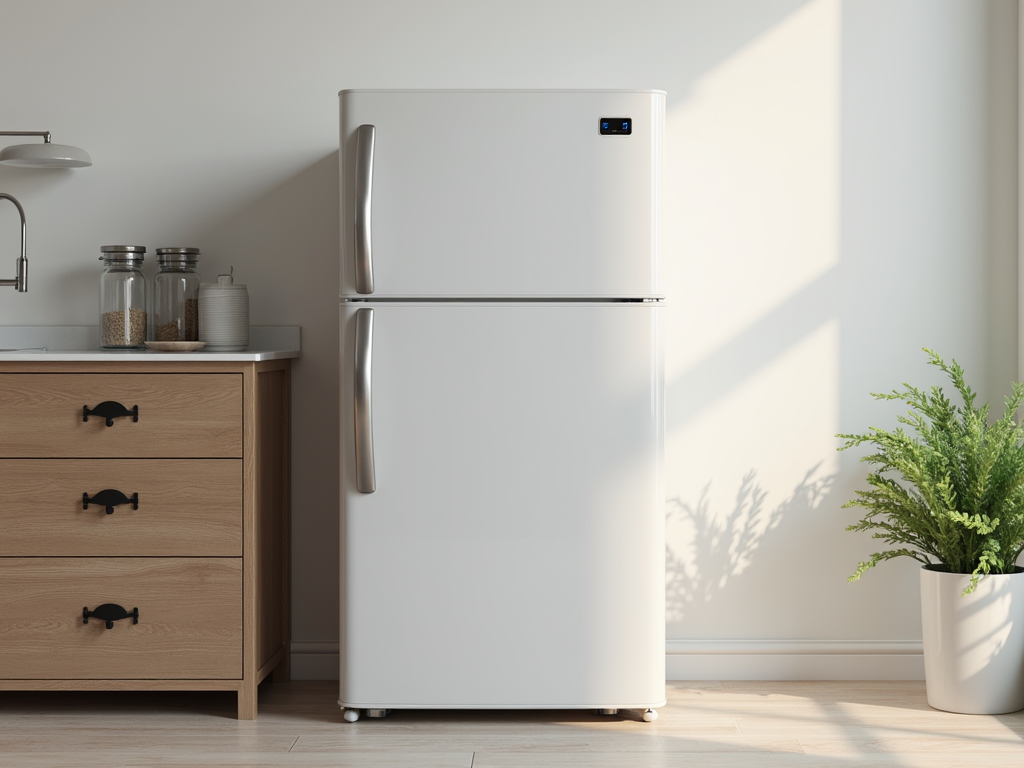Quick facts
Can't find the answer you're looking for? Please get in touch with our friendly team.
What number is best for a mini fridge?
The ideal temperature for a mini fridge is typically between 32°F and 40°F (0°C to 4°C). Setting it around 37°F (3°C) is often considered optimal for preserving food freshness while preventing freezing.
What are the disadvantages of mini refrigerator?
Mini refrigerators have limited storage space, making it hard to fit larger items. They often consume more energy per liter than full-sized models, which can increase electricity bills. Additionally, they may not cool as effectively, leading to uneven temperatures.
How long will a mini fridge last?
A mini fridge typically lasts about 10 to 15 years with proper care. Factors like usage, maintenance, and quality of the appliance can affect its lifespan. Regular cleaning and avoiding overloading can help extend its durability.
Do mini fridges run constantly?
No, mini fridges do not run constantly. They cycle on and off to maintain the desired temperature. When the internal temperature rises, the compressor activates to cool it down, then shuts off once the set temperature is reached.
Are mini fridges worth it?
Yes, mini fridges can be worth it if you need extra storage for beverages or snacks in small spaces like dorm rooms, offices, or bedrooms. They save space and provide convenience, but consider energy efficiency and capacity to ensure it meets your needs.
What are the pros and cons of a mini fridge?
Pros of a mini fridge include space-saving design, energy efficiency, and convenience for storing snacks and drinks. Cons are limited storage capacity, potential noise, and less effective cooling compared to full-size fridges. They may not be ideal for larger households or extensive food storage.
Who makes the best mini fridge?
Brands like Danby, Haier, and BLACK+DECKER are often rated highly for mini fridges. Danby is known for its energy efficiency, while Haier offers stylish designs. BLACK+DECKER is popular for affordability and reliability, making them great choices for home use.
What is the most reliable brand of mini fridge?
Some of the most reliable brands of mini fridges include Danby, Haier, and Midea. These brands are known for their durability, energy efficiency, and good customer service. When choosing a mini fridge, consider size, features, and warranty for the best experience.
Category Overview
Introduction
Mini fridges serve as versatile companions in any home, providing essential cooling solutions that enhance everyday life. Whether you need a quick refreshment while binge-watching your favorite show or want to keep beverages handy during a gathering, these compact appliances play a significant role in comfort and utility. They effortlessly blend functionality with decor, making them not just practical additions but also stylish elements that complement your living space.
Functionality
The primary function of mini fridges is straightforward: they chill food and drinks. However, their versatility extends beyond the kitchen. You can place them in your living room for easy access to snacks during movie nights, in your bedroom for midnight cravings, or even in outdoor spaces like patios for entertaining guests. Many models offer unique features such as adjustable shelves for customizable storage options or energy-efficient designs that help save on electricity bills, making them both practical and eco-conscious choices.
Design & Style
When it comes to design, mini fridges come in various styles and materials that can cater to every aesthetic preference. Common materials include sleek metal finishes for a modern look or retro-inspired designs that add charm to vintage decor. You might find mid-century modern styles with clean lines or farmhouse options featuring distressed textures. Personalization is easy; many brands offer color choices ranging from bold hues to neutral tones, allowing you to match your fridge with existing decor themes—be it rustic vibes or minimalist allure.
Practical Considerations
Selecting the right mini fridge involves several considerations. First, think about the size of the room where it will reside; a smaller unit may be ideal for cozy spaces while larger ones could fit well in open areas. Material durability is another factor; metal options tend to be more resilient than plastic counterparts. Assess how you intend to use the fridge—will it store heavy-duty items like meal prep containers or will it primarily house beverages? Avoid common mistakes like underestimating storage space; it's better to have extra room than regret limited capacity later.
Comparison and Alternatives
When comparing materials and styles, consider the pros and cons of each. Metal mini fridges are typically more durable but can be heavier than plastic models which offer flexibility in weight but may lack sturdiness over time. Round designs may fit snugly into corners but can limit shelf space compared to rectangular versions that offer more organization potential. Ideally, choose based on your style preference—do you lean towards sleek minimalism or eclectic bohemian?
Trends and Popular Items
Currently, there’s a rise in demand for smart mini fridges equipped with tech features like temperature control via smartphone apps. Customers are also gravitating toward energy-efficient models as part of an eco-friendly lifestyle choice. Additionally, retro-style mini fridges continue to capture hearts with their nostalgic appeal—a perfect addition for kitchens aiming for a vintage flair. In conclusion, whether you're looking for convenience during leisure time or enhancing your hosting capabilities at home, mini fridges provide an excellent solution tailored for various lifestyles while adding style to any setting.


